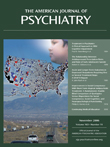A Functional Magnetic Resonance Imaging Study of Social Cognition in Schizophrenia During an Acute Episode and After Recovery
Abstract
Objective: Difficulty with social interactions is a characteristic of schizophrenia. The authors used functional magnetic resonance imaging (fMRI) to investigate brain activation changes during a social cognition paradigm in patients with schizophrenia during and after an acute episode and their association with social and executive function. Method: In a longitudinal study design, 14 patients with schizophrenia experiencing an acute episode had an fMRI scan. They returned for a follow-up scan after clinical improvement. Fourteen healthy comparison subjects were also scanned twice with approximately the same time interval between scans as in the patient group. The authors employed a social cognition fMRI paradigm involving empathic and forgivability judgments. Schizophrenia symptoms, social functioning and illness insight scales, and the Wisconsin Card Sorting Test were used to examine whether improvement on these measures was associated with recovery of brain activation in response to the social cognition paradigm. Results: After recovery from the acute episode, patients exhibited increased activation in the left medial prefrontal cortex, which was, in turn, significantly correlated with improved insight and social functioning. Decreased symptom severity and improved performance on the Wisconsin Card Sorting Test were not significantly associated with increased left medial prefrontal cortex activation. Conclusions: This is the first study to the authors’ knowledge to use a social cognition paradigm to reveal improved left medial prefrontal cortex activation in schizophrenia after recovery from an acute episode. These results suggest that restored left medial prefrontal cortex activation may mediate improvement of insight and social functioning in patients with schizophrenia.



